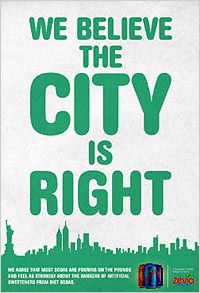beverages
Zevia Sees Opp: Ads Back N.Y.'s Soda Ban Plan
- by Karlene Lukovitz @KLmarketdaily, June 4, 2012
 It’s hardly surprising that McDonald’s –- along with major beverage makers –- has started using social media and other tactics
to oppose New York City’s proposed ban of the sale of most sugar-sweetened drinks 16 ounces or larger in restaurants, fast-food venues, delis, movie theaters and sports arenas.
It’s hardly surprising that McDonald’s –- along with major beverage makers –- has started using social media and other tactics
to oppose New York City’s proposed ban of the sale of most sugar-sweetened drinks 16 ounces or larger in restaurants, fast-food venues, delis, movie theaters and sports arenas.
But at least one beverage maker, Zevia, sees the proposal as a prime marketing opportunity.
The privately owned, Seattle-based company launched in 2007, reportedly the first U.S. maker to market sodas entirely sweetened by natural, plant-based stevia (it now offers 15 varieties of zero-calorie sodas), launched a series of ads in Manhattan subways on June 4.
Zevia’s ads join NYC-sponsored subway ads warning against “pouring on the pounds” and risking diabetes and other health issues by drinking sugary sodas, plus American Beverage Association (ABA)-run subway ads from Coca-Cola and PepsiCo that seek to counter NYC’s ads by touting the many choices that major beverage makers have made available to consumers.
advertisement
advertisement
Zevia’s ads, designed by Studio Number One, feature headlines such as “We Believe the City is Right,” “We Believe We Can Stop Pouring on the Pounds” and “We Believe in Smarter Soda Choices, Not Just More Soda Choices.” In addition, one ad promotes Zevia’s all-stevia sweetener: “We Believe Soda Should Be Free of Artificial Sweeteners.”
“Sure we’re a business -- but we got into this business to create a better-for-you alternative to conventional soda,” says Zevia CEO Paddy Spence. “We applaud [NYC] Mayor [Michael] Bloomberg and the city for encouraging New Yorkers to live healthier lifestyles…Our products are a small step people can easily take toward a healthier lifestyle.”
Meanwhile, McDonald’s
joined the public fray last Friday by tweeting to @MikeBloomberg: “We trust our customers to make the choices that are best for them.”
In addition, a McDonald’s spokesperson,
echoing the ABA’s arguments, told various media that "public health issues cannot be effectively addressed through a narrowly focused and misguided ban… This is a complex topic, and one
that requires a more collaborative and comprehensive approach."
McDonald’s -- which one analyst estimates yields about 5% of its revenues from soft drinks, according to Reuters -- currently defines 16 ounces as its “small” soft-drink size, with 21 ounces
“medium” and 32 ounces “large” (its kids size is 12 ounces).
Among beverage makers, Coca-Cola (which immediately came out fighting) has the most to lose if NYC’s proposition passes. (Once NYC’s health department board sees the proposal on June 12, there will be a three-month comment period; if passed, the regulation would be implemented in March 2013.)
Coca-Cola
heavily dominates the U.S. fountain-drink market, with a 70% share, while PepsiCo has 19% and Dr Pepper Snapple Group has 11%, according to Beverage Digest.
Moreover, Coca-Cola has been
aggressively pushing to expand the adoption of its interactive Freestyle machines (which offer more than 100 choices, including customized drinks) in restaurant chains and other high-volume venues.
Vending-machine sales generally yield higher profits than sales of beverages sold in bottles and cans.
“To me, [the NYC proposal could] put a really big wrench” in the Freestyle initiative, Moody's analyst Linda Montag told Reuters. Montag added that if the proposal goes through, beverage makers in general might have to try to make up for volume losses by upping prices a bit.
Not only is New York City a massive market, but as various industry analysts have pointed out, it tends to set precedents for other areas of the country -– which could potentially do real damage to the fountain business that accounts for about 24% of the soda industry’s annual $75.7 billion in sales.
"New York is a mega-market, but more importantly it is New York.
It sets the pace. What happens in New York has a strong influence on the rest of the country,” BevMark Consulting’s Tom Pirko told Reuters.
Given that Bloomberg appoints the health
board members, and that health commissioner Thomas Farley, who supports the measure, is the board’s chairman, the likelihood of approval is considered high.
However, the proposal, like other health initiatives from Bloomberg (some of which have prevailed, and others failed) is now the subject not only of pushback from the beverage and restaurant industries (on June 1, ABA ran a full-page ad in The New York Times asserting that studies do not support that sugar-sweetened beverages are driving obesity), but substantial public debate -- much of which is negative.
While health agencies and some consumers support the measure, many consumers are expressing offense over what they see as an intrusion on their personal choices. Even The New York Timeseditorialized that Bloomberg has gone too far this time with his health initiatives.
To counter the pushback, Bloomberg and the NYC health department have created an area on the NYC.gov site posting comments in support of the proposal from public officials and health advocates.




